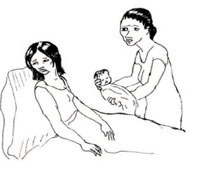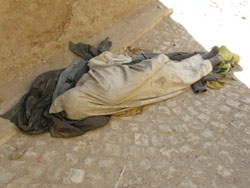10.4.1 The main risks in mental illness

However, this does not mean that risks to others, though rare, should be dismissed from the mind altogether. For example, if a new mother experiences a severe mental disorder, such as acute postnatal depression, you must keep in mind the potential risk to the newborn baby. The mother may fail to look after or feed the baby as she would otherwise do (Figure 10.5) and, without the support of others (including yourself), the baby could be at risk of neglect. In the most extreme (and rarest) of cases, the mother may also harm or even kill her baby. When a mother has such severe symptoms of mental illness, you should try to locate other family members or close friends who can offer the mother support by taking on some caring responsibilities for the baby.
The main risks arising from mental illness are summarised in Table 10.1, together with a brief indication of how you would assess them. You will learn about risk assessment in more detail in Study Session 11.
| Risk | Risk assessment |
|---|---|
| Risk of suicide | Any mental disorder increases risk of suicide. Ask gently but directly about it (see Study Session 18). |
| Risk of self-neglect | In this case, the person may not eat and drink enough or dress appropriately, wander the streets disregarding the weather, sleep rough and so on (see Figure 10.6). Such self-neglect is more common with severe mental disorders. You can ask the family or the patient directly if they are eating enough and/or looking after themselves. |
| Risk of violence | Very uncommon. Ask what triggers the violence and explore past history. If there is a past history of violence, or if violence occurs for no obvious reason, this increases the risk of further violent behaviour in the future. Also check if incidents of violence have been related to the misuse of substances such as alcohol or khat. Addressing this misuse may substantially reduce the risk posed. |
| Risk to children and other dependents | If children or other dependents (for example elderly or sick people) are living in a house alongside someone with serious mental illness, ask how they find living with this person. Specifically, ask if there are frequent conflicts, any assaults or times when they feel particularly threatened; try to involve the neighbours in answering these questions. If you find there is a risk to children or other dependents, ask what is being done to address it. Make sure the person is receiving the appropriate treatment. |
| Risk of abuse | Commonly, persons with SMI are likely to be the victims of abuse or violence. Many are stigmatised, insulted and even physically abused because of their condition. This risk is primarily tackled by educating the community about mental health issues. |

10.4 Assessing the general risks from mental illness
